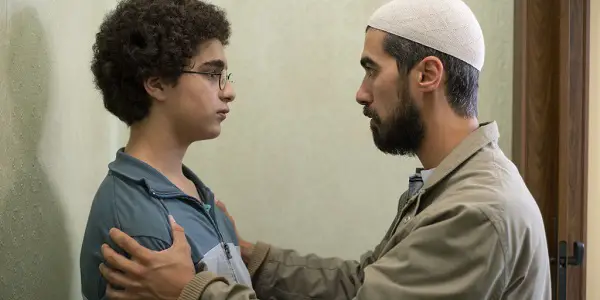How does a young person become radicalized, with their obsessions evolving from video games to religious violence? That’s the heady issue that Jean-Pierre and Luc Dardenne, the Belgian filmmakers renowned for social realist dramas such as The Kid with a Bike and Two Days, One Night, explore in their latest feature.
Winner of Best Director at the 2019 Cannes Film Festival, Young Ahmed follows the titular character as he plots to kill his teacher over what he perceives to be her heretic behavior. It’s an intense examination of how one young person can become wholly beholden to an ideology, to the point that his fanaticism takes priority over his family and friends. It’s a hugely important topic that the Dardennes attempt to tackle in just under 90 minutes; the result is a film that, while impactful, also feels overly rushed, leaving the viewer with unanswered questions.
All About Ahmed
Ahmed (first-time actor Idir Ben Addi) is a bespectacled, baby-faced 13-year-old who is developing an increasingly blind devotion to an extremist interpretation of Islam thanks to his loyalty to a local imam (Othmane Moumen) who sees their religion as being under attack by secular society. The imam’s beliefs have influenced Ahmed to the point that the teen constantly berates his single mother (Claire Bodson) for drinking alcohol and his elder sister for wearing revealing clothing. His mother doesn’t understand where this abrupt change in her son’s mindset came from; it seems that, with no father at home, Ahmed has decided to model himself after the one male role model he has in his life. It doesn’t help that the imam constantly reminds Ahmed of a deceased cousin of his who has been deemed a hero for dying while waging jihad, showing him websites where his cousin’s face is pictured enshrined in posthumous glory.

One of the targets of the imam’s anger is Inès (Dardennes regular Myriem Akheddiou), a Muslim teacher who previously helped Ahmed with a learning disability; despite this once-close relationship, Ahmed will no longer shake her hand, as he now believes women are impure. Inès wants to teach her students Arabic through popular music — a concept that some members of the local Muslim community reject, believing that Arabic should only be learned via the Quran. She also happens to have a Jewish boyfriend. Convinced by the imam that Inès is an apostate, and wanting to earn his own share of the respect the imam has for his martyred cousin, Ahmed decides to kill her, heading to her apartment with a knife hidden in his shoe.
The Aftermath
Ahmed’s attack on Inès fails, and the teenager is sent to a juvenile rehabilitation facility. As part of his rehabilitation, he works on a nearby farm alongside a teenage girl named Louise (Victoria Bluck), with whom he develops an uneasy mutual attraction despite his beliefs. At first, it’s hard to tell whether the efforts of Ahmed’s counselors to convince him of the harmfulness of his actions are being effective, but soon, it becomes sadly apparent that Ahmed’s extremist beliefs are rooted far deeper within him that he has initially let on. Moreover, he’s still harboring a desire to do harm to Inès, despite being aware of the severe trauma his first attack caused her; when she lays eyes on Ahmed for the first time since the attack, she dissolves in tears and leaves the room.
As Ahmed, Idir Ben Addi is extraordinary, his youthful and innocent visage belying the misguided, righteous rage that burns in his belly; his violent actions seem all the more shocking when carried out by an individual who appears so harmless on the surface. Yet despite his actions, the Dardennes’ view of Ahmed is never anything less than utterly empathetic. Even though it seems that Ahmed has gone so far down the radical rabbit hole that he may be beyond saving, the Dardennes’ pepper their story with pinpricks of light that remind us that, while Ahmed might have attempted a terrible act, he is still a child and a deeply impressionable one at that.
Can society give up on such a child, even if he has seemingly given up on society? Is it possible to unravel the radical teachings that have wrapped themselves so tightly around his brain that they threaten to cut off circulation, preventing any other lessons from reaching him? The Dardennes’ conclusion seems to be that even if it isn’t possible, it is always worth our time and effort to try.
The film’s final act builds in intensity until it finally bursts, yet when it does, it feels less like the natural ending to Ahmed’s story and more like the Dardennes didn’t know how to end it, a slow burn of a story snuffed out in a moment that doesn’t give the audience enough time to absorb what has just happened. Despite the Dardennes’ keen understanding of the complexities of human nature and deep sympathy for the marginalized in society, which lend themselves naturally to a story such as this, one cannot but wonder how a Muslim filmmaker might have handled Young Ahmed differently. The Dardennes are great storytellers, but was this their story to tell? Despite the film’s various qualities, I’m left feeling unsure of the answer.
Young Ahmed: Conclusion
Carried by Idir Ben Addi’s brilliant performance, Young Ahmed is an intriguing character study of one young man’s fanaticism, though one is still left wanting something more.
What are your thoughts on Young Ahmed?
Young Ahmed will be released on DVD and Blu-ray in the U.S. by Kino Lorber on June 16, 2020. You can find more international release dates here.
Does content like this matter to you?
Become a Member and support film journalism. Unlock access to all of Film Inquiry`s great articles. Join a community of like-minded readers who are passionate about cinema - get access to our private members Network, give back to independent filmmakers, and more.